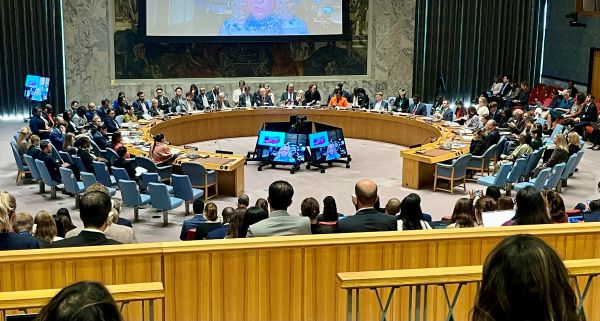This week, the UN Security Council convened the annual open debate on women, peace, and security, marking the 25th anniversary of the adoption of UN Security Council Resolution 1325, which established the Women, Peace, and Security (WPS) agenda as a core pillar of the UN Security Council’s work.
The WPS agenda was built on the principle that no peace is possible without the full, equal, meaningful, and safe participation and leadership of women, and it sought to ensure the protection of women and girls from violence in conflict.
Yet 25 years on, a growing number of women and girls face alarming levels of violence and brutality in conflict. As the UN Secretary-General noted in his opening remarks, 676 million women were reported to be living in conflict areas in 2024—the highest levels in decades. The number of women and children killed in armed conflict between 2023-2024 has quadrupled from the two years prior—70 percent of women killed are in Gaza. Cases of conflict-related sexual violence continue to rise, with sexual violence being used as a weapon of war in multiple conflicts, such as Sudan and the Democratic Republic of Congo, while perpetrators of violence continue to act with impunity across the world. Meanwhile, women-led organizations and women human rights defenders continue to be underfunded, sidelined from decision-making, and under attack, despite the critical role they play on the frontlines of protecting women in conflict.
Ahead of this year’s open debate and as part of the NGO Working Group on Women, Peace, and Security, the Women’s Refugee Commission joined more than 600 civil society leaders in demanding that UN Members take urgent action to uphold the WPS agenda. At the open debate on Monday, the NGO Working Group-nominated speaker Noura Erakat, a Palestinian-American human rights attorney, addressed the UN Security Council. She spoke about how the principles of WPS remain out of reach for women in Palestine and called on Member States to take urgent action to uphold international law and ensure that Palestinian women meaningfully participate in rebuilding their own societies, reminding States, “Should you be paralyzed by fear, I encourage you to look to Palestinian women—they refuse to surrender. Neither should you.”
WRC has documented extensively the experiences of women living in conflict and displacement,. In Sudan, our research investigated how women have been impacted by displacement and violence and found that young Sudanese women are being denied access to education, employment, and healthcare; our recent report on Gaza found how women are disproportionately impacted by famine and food insecurity, starving themselves so their children can eat; and our upcoming report on the Democratic Republic of Congo will examine how women-led organizations have been affected by humanitarian funding cuts and the ongoing brutal conflict. We stand in solidarity with all women affected by conflict and displacement and with the courageous civil society groups that work tirelessly to protect women on a daily basis.
Sadia Kidwai, WRC’s Advocacy Officer said, “Statements by UN Member States must be matched by urgent action to fulfill the promise of the WPS agenda. The 676 million women and girls living in conflict cannot afford to wait. UN Member States must uphold international law and hold perpetrators of violence accountable; provide financial support and protection to women-led organizations and women human rights defenders; and ensure the full, equal, and meaningful participation of women at all levels of decision-making. Only with the full protection and participation of women can we hope to build just and sustainable peace.”


